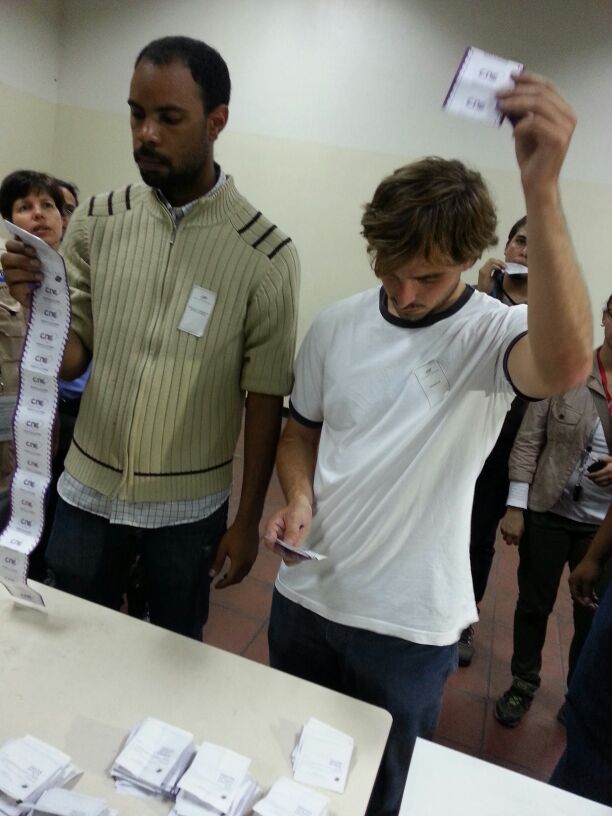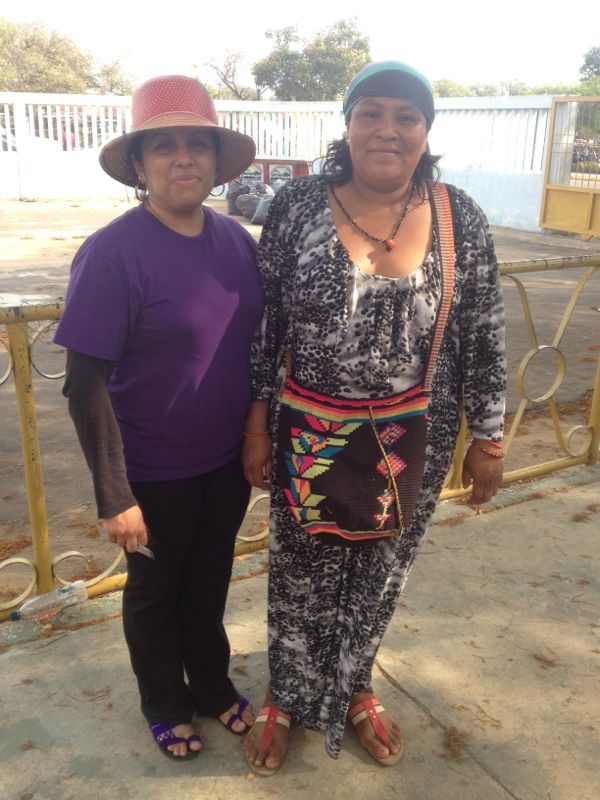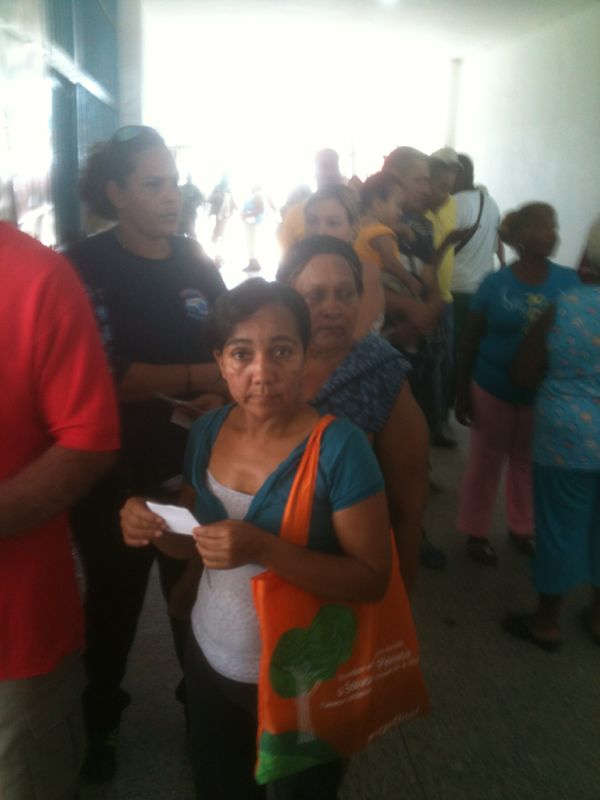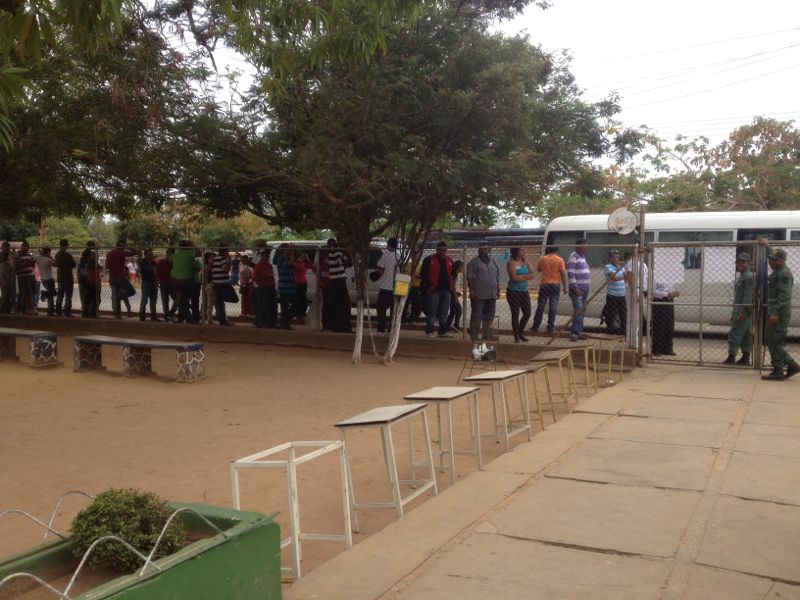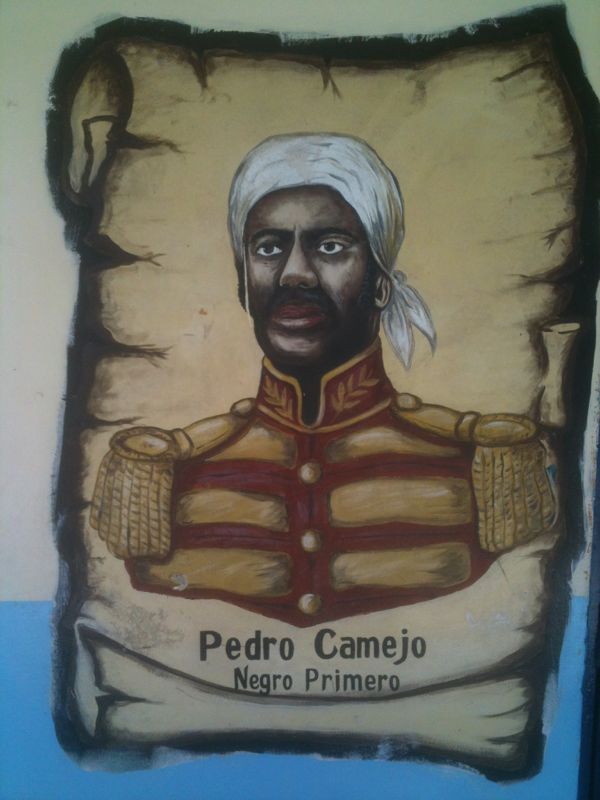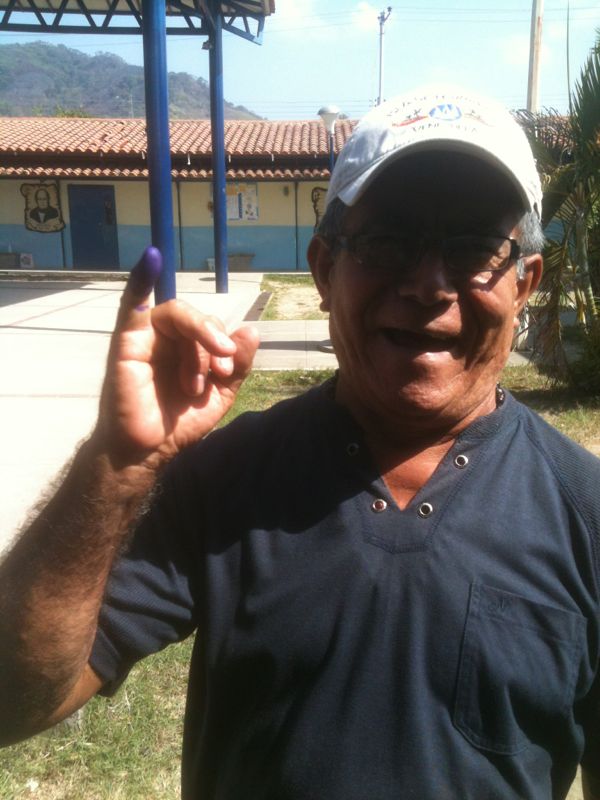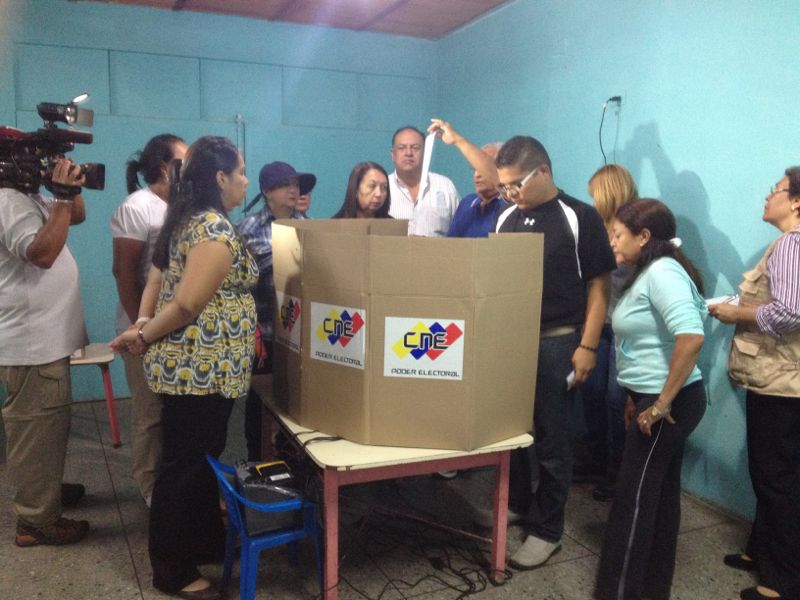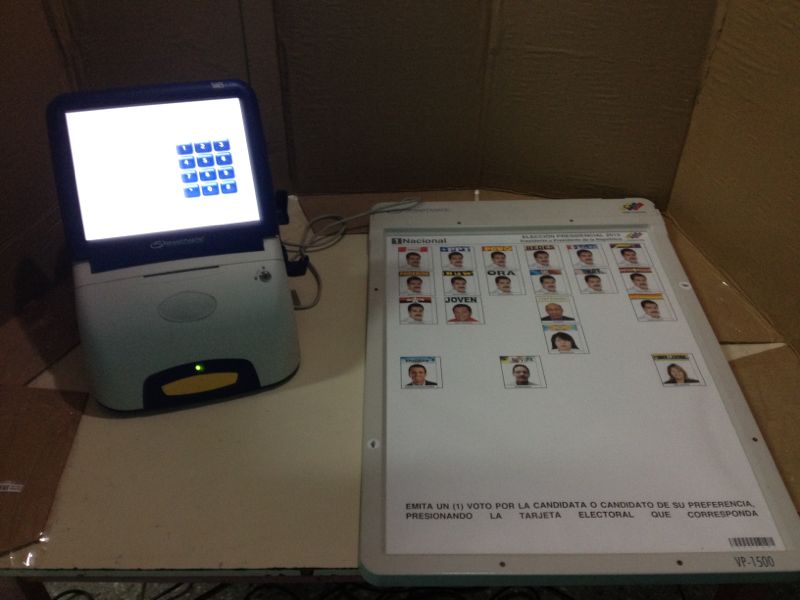April 14, 2013
10:12 PM EDT: The National Electoral Council (CNE) officially declared Nicolás Maduro president. Tibisay Lucena, CNE’s president, made the announcement with Maduro standing by her side.
According to unconfirmed reports, after being declared the winner, Maduro suggested that the equivalent of a coup is being prepared by those who will not respect Venezuelan constitutions. Jorge Rodríguez, the governing PSUV’s campaign manager, has been quoted saying that Capriles, by disregarding the CNE’s results, “is calling for a coup against Venezuelan democracy.”
Regarding a potential audit or re-count, Professor David Smilde reports that an audit of a majority of the votes is always conducted after an election:
Venezuela uses electronic voting machines that emit a paper ballot which the voter then deposits in a sealed box. In all elections 53-54% of these boxes are subject to citizen audit immediately after the election. Citizens who were selected to work a given election table and witness from political parties go through the votes one by one. That process takes a couple of hours.
Mark Weisbrot noted this in his response to initial reports of the White House’s statement in support of a full re-count, which he called “calculated” and “very suspicious.” Since then, the State Department press office released the transcript for its daily press briefing, which demonstrated the U.S. government’s insistence on calling for a recount despite no indications that the CNE was considering such a move. Reporters present at the briefing attempted to get a firm answer from the State Department as to whether it was suggesting that the U.S. would not recognize the election unless all votes were re-counted, as only the opposition has demanded. Here is an excerpt from that exchange.
QUESTION: Yes. Actually – thank you – actually the electoral national council has not said that there will be a recount. It’s something that the opposition has asked for and Maduro has said that he’s for an audit, which is a regular process that they do over there. But the electoral national council has not said anything on that, and actually they said today that they will announce Maduro as an official winner. So are you worried about that?
MR. VENTRELL: Again, it’s our opinion that it makes sense that a recount should be completed before any additional steps, including official certification of the results, occur. So that’s what we’re urging at this time.
QUESTION: So would it be worrying if they announce Maduro as a winner without a recount?
MR. VENTRELL: I mean, I think I’ve stated as clear as I can that any – the recount should be completed before any additional steps are taken. That’s the U.S. position.
QUESTION: Well, does that mean that the legitimacy – in your eyes, the legitimacy of the election will be compromised if the council goes ahead and certifies the vote before a recount?
MR. VENTRELL: Well, they haven’t yet, so we’re not there yet.
QUESTION: Well, yeah, but Patrick, this is one of those hypothetical questions that you’re inconsistently choosing not to answer.
MR. VENTRELL: All right.
QUESTION: You wouldn’t – so it would be fine with you if they go ahead and do the recount – don’t do the recount before certifying. Is that what you’re saying?
MR. VENTRELL: We’re not going to be getting into hypotheticals. I mean, your hypothetical had like a triple negative in there. I’m not even sure I followed it. But the bottom line is —
QUESTION: Oh, okay. So if North Korea tests a nuclear device, there won’t be any response from the U.S? That’s a hypothetical.
MR. VENTRELL: Thanks for —
QUESTION: So why can you not answer? There’s certainly – you must have an opinion one way or the other. If you say that you think that it makes sense and there should be a recount before the vote is certified, surely you can say something about if there isn’t a recount and the vote is certified.
MR. VENTRELL: I mean, we want —
QUESTION: Would that —
MR. VENTRELL: Matt —
QUESTION: — be problematic for the United States?
MR. VENTRELL: Let me be very clear. We want the recount to happen.
QUESTION: Yes.
MR. VENTRELL: If it doesn’t, then we’ll address it at that time. We’re not there yet. We’re very clear that we want the recount to happen.
4:48 PM EDT: As opposed to the response from the White House and from the Organization of American States (OAS), the Union of South American Nations (UNASUR) has unequivocally stood by the official results from last night. UNASUR, which sent an election monitoring delegation to Venezuela, said in part:
Regarding the official electoral results released yesterday, UNASUR’s Electoral Accompaniment Mission declares—as it has since its installation in the country— that the results announced should be respected because they were emitted by the National Electoral Council, the only competent authority in these matters according to the constitutional and legal provisions of the Bolivarian Republic of Venezuela.
You can read the whole statement here (in Spanish).
4:47 PM EDT: In a Q&A on the Washington Office on Latin America’s (WOLA) Venezuela Politics and Human Rights blog, Professor David Smilde offers this analysis of a potential audit:
It is unlikely that an audit of paper ballots would show a different result from the electronic tally. The paper ballots are actually produced by the machine itself when a citizen votes. This system was developed at a time in which there was a lot of distrust in the idea of electronically tabulating and transmitting the votes. The paper ballot was a backup. But the electronic machines have been audited many times by international, national and opposition technicians. More likely to affect the vote totals will be inclusion of the international vote (which will be overwhelming for Capriles) and addressing the 3,000 irregularities the opposition says it has documented. Even then, however, the vote’s outcome is unlikely to be reversed.
With regards to the U.S. role in the post-election environment, Smilde writes that “[t]he U.S. would do well to stay on the sidelines.”
4:46 PM EDT: White House spokesperson Jay Carney told a news briefing that an audit of all votes cast is “necessary.” Reuters reported Carney’s statement regarding the election as follows:
“Given the tightness of the result – around 1 percent of the votes cast separate the candidates – the opposition candidate and at least one member of the electoral council have called for a 100 percent audit of the results,” White House spokesman Jay Carney told a news briefing.
“This appears an important, prudent and necessary step to ensure that all Venezuelans have confidence in these results,” Carney said. “In our view rushing to a decision in these circumstances would be inconsistent with the expectations of Venezuelans for a clear and democratic outcome.”
Mark Weisbrot responded to the news with a blog post on CEPR’s Americas Blog, in which he called the White House move “ominous.” Weisbrot writes:
If the White House merely wanted to support a 100 percent audit, it could do so privately, even to both sides (the NYT reported today that President Maduro reached out to the Obama administration through Bill Richardson, looking to improve relations). The White House statement today shows once again that it is definitely not interested in improving relations.
Click here to read the entire post at the Americas Blog.
4:07 PM EDT: The Secretary General of the Organization of American States (OAS), José Miguel Insulza, expressed his support for a full re-count. The relevant section of Insulza’s brief statement reads:
“Faced with the results released by the National Electoral Council (CNE) at the end of the day Sunday, and then the announcement by the representatives of the government and the opposition on the need to conduct an audit and a full recount of the vote, Secretary General Insulza expressed his support for this initiative and made available to Venezuela the OAS team of electoral experts, of recognized prestige and long experience in the field.”
According to reports, Maduro has said he is open to a full re-count and is confident in the results:
“We are calling for respect of the results. If they want do an audit they are welcome to do it. They can do whatever audit they want to do. We trust in the Venezuelan electoral system. We welcome an audit.”
3:29 PM EDT: Reporters in Venezuela have said that Capriles is holding a press conference to denounce the National Electoral Council’s (CNE) decision to swear in Maduro as president. According to these reports, the opposition camp has sent a letter to CNE requesting that they delay the official ceremony. In the event that the swearing-in moves ahead as supposedly planned, Capriles has reportedly called on his supporters to rally outside CNE offices around the country. Reporters have also said that Capriles called for rallies at 8pm this evening, encouraging his supporters to make their voices heard and express their anger. The potential for conflicts has been noted.
2:43 PM EDT: CEPR coverage continues with analysis from Mark Weisbrot.
1. CEPR Co-Director Mark Weisbrot has a column in The Guardian on Nicolas Maduro winning the April 14th presidential election in Venezuela. He writes:
“Capriles is demanding an audit of 100 percent of all votes; Maduro has apparently agreed. But the audit is unlikely to change the outcome. Unlike in the United States, where in a close election we really don’t know who won, the Venezuelan system is very secure. Since there are two records of every vote (machine and paper ballot), it is nearly impossible to rig the machines and stuff the ballot boxes to match. Jimmy Carter called Venezuela’s electoral system ‘the best in the world.'”
Read the rest of the Guardian column here.
2. This morning on Democracy Now!, Mark Weisbrot debated reporter and author Rory Carroll on the implications of the election results. Weisbrot started by noting the socioeconomic gains as well as the significance of Venezuela’s heralded voting system:
“. . . the majority, at least, did vote for continuity, and I think they did so mainly because there was a large increase in living standards for people over the past 14 years . . . the poverty was reduced by 50 percent, extreme poverty by 70 percent. You had millions of people got access to free healthcare for the first time. Unemployment was 14-and-a-half percent when Chávez took office; it was 8 percent last year.
“I think also it was very lucky for the country that the Chávez government established this really secure electoral system. Now, you can see Capriles is—he’s kind of playing to the part of the opposition that in every election has not wanted to accept the results. Every election since 2004, there’s been a part of the opposition that just says, you know, ‘We don’t buy it.’ But he’s not really going to do anything, I don’t think, because it’s very easy to have an audit. The system they have, Jimmy Carter called it the best in the world.”
1:10 AM EDT: Corey Robin provides a glimpse of what much initial U.S. media coverage of the election results is likely to look like, comparing the early New York Times treatment of Venezuela’s election yesterday with Bush’s similarly close victory over Kerry in the 2004 U.S. elections.
April 15, 12:55 AM EDT: Capriles is speaking, saying he will not recognize the result until there has been a “vote by vote” count.
11:53 PM EDT: Maduro is giving his victory speech. What Capriles will do is the big question now.
11:49 PM EDT: CNE announces that with 78.71 voter participation, Maduro has won with 50.66 percent of the vote, to Capriles’ 49.07. CNE president Tibisay Lucena says the result is “irreversible.”
11:45 PM EDT: The CNE is about to make an announcement. Watch live here.
11:36 PM EDT: The lack of updates here is due to the lack of news from the CNE. Reportedly the CNE has counted almost all of the votes, but they have yet to release any results. There is a rumor that they will convince the loser to accept the results before going public with them. The results are also widely rumored – and increasingly widely expected – to be close.
9:57 PM EDT: An election monitor in Caracas reports:
8:23 PM – Now watching the citizen audit at Fermin Toro, a high school in Caracas. There were 12 voting stations and the turnout was 73.3%. [4,773 out of a possible 6,465 voted].
After reading off all of the ballots and putting them in stacks they are counting each stack and comparing them with the number on the tape.
9:26 PM – The count matched perfectly.
The vote result announcement for the election is expected soon. Rumors are flying that Maduro won but that Capriles won’t accept the results.
9:19 PM EDT: Although no results have been announced yet, opposition candidate Henrique Capriles is crying foul, according to Reuters, accusing the CNE of a plot to “change the will of the people.” As we noted at the beginning of our blogging today, Capriles has expressed distrust in the CNE ahead of these elections even though he quickly accepted the election results when the CNE announced them in October.
9:09 PM EDT: It is looking increasingly likely that voter turnout today was indeed high, perhaps close to the levels seen in the October elections. Luis Vicente Leon of opposition polling firm Datanálisis has also said the shorter lines observed by many today may result from the quicker, more familiar voting process.
9:07 PM EDT: An election monitor in Maracaibo, Zulia reports:
7:36 PM EDT: At Colegio Santa Mariana de Jesus where there are 12 mesas. 4641 people had voted by 4 pm out of 6487 registered.
Four mesas were chosen for audit by picking numbers at random from a pile of folded numbers. I sat in the audit for Mesa 10. One person counted how many people signed the voter registration list and gave their finger print. Another person tallied how many people voted based on a print out from the voting machine. The two numbers of people must correspond to detect any fraud from people voting electronically without signing in. In mesa 10, the numbers matched.
7:55 PM EDT: We also watched while they counted all individual receipts deposited in ballot boxes to make sure they corresponded with the signed registration lists and the voter machine print outs. So far the numbers match.
There were 4986 votes out of 6487. 76.6% voter turnout.
8:57 PM EDT: An informal election monitor (whom we have not cited before) sends us this report:
There are 10 of us in Caracas from the U.S. doing some informal observations of the election process here. Today we visited several polling places, including Colegio Maria Santisima, Magaly Burgos De Lopez, Colegio San Agustin, and Escuela Bolivariana Gabriella Mistral. At the last one, we were actually invited in to witness the voting process.
At every site, we saw a very efficient process and no problems were reported, other than the need to replace one faulty machine. This is actually the third election process they have had in this country in the past year, so the process is moving along very well. People talk about how quickly they got through the lines and how smoothly things went.
What we saw when we were invited in was a model of transparency, with many checks and balances to assure integrity. People must show identification, their serial number is then entered into a digitial device and their photo comes up, then they give a thumb print to verify their identity again. They then proceed to vote electronically, receiving a paper receipt which they check and deposit in a box for later auditing. They then sign out, give a thumb print next to their signature, and dip their pinky finger in a vial of indelible ink to assure that they can’t vote again. All of this is facilitated by randomly chosen registered voters and witnessed by representatives of the political parties. There is an audit of 55% of the voting tables to check the paper receipts against the electronic returns.
Jimmy Carter called it the best voting system in the world and we could see why.
8:07 PM EDT: Several other chavista Twitter accounts have also been hacked, including those of the PSUV, National Assembly president Diasdado Cabello, and Foreign Minister Elias Jaua. The Venezuelan government reportedly temporarily interrupted Internet service in an effort to stem the hacks.
6:30 PM EDT: Polls officially closed.
Nicolas Maduro’s Twitter account appears to have been hacked, perhaps by Lulzecperu which previously has targeted the Venezuelan Defense Ministry and other Latin American defense ministries.
6:21 PM EDT: Neil Findlay, a Labour party member of the Scottish parliament monitoring today’s elections, has an article in The ScotsmanThe Scotsman today that reads in part:
Arriving in Caracas on Wednesday at the invitation of the CNE, a state body established by the constitution with responsibility for overseeing the Venezuelan electoral process, I joined 130 international observers invited to independently scrutinise the system. This is the system described by the Carter Centre – a human rights organisation established by former US president Jimmy Carter – as “the best in the world”.
…The Capriles’ campaign, seeing the polls going against them, threaten not to recognise the result. If, as I expect, Maduro wins then the influence of Chávez will run through his presidency and through the country for many years to come. Whilst their politics could not have been more different, this is something Chávez shares with Baroness Thatcher.
6:20 PM EDT: Just 10 more minutes before official closing of polls.
5:59 PM EDT: An election monitor in Maracaibo, Zulia state reports:
5:16 pm- At Jardin de Infancia Loma Linda, 1,900 have voted already out of 2,266 people registered, and four mesas.
This was not on our list, but two from our CNE team voted there. Outside the center a hand full of people complained of physical and verbal aggression by Maduro supporters on Friday when the voting machines were being set up.
I spoke with a group of about 30 people, and there was no report of any incident today. People were yelling that they were very proud of their voting process. A Maduro supporter said a CNE worker had asked him to take off his Maduro hat.
5:21 PM EDT: At Colegio Nuestra Señora del Pillar. 7,482 people registered to vote, and 6,404 had voted by 4:45.
No hint of mobilization in Maracaibo. The last three centers have had only handfuls of people voting.
5:45 PM EDT: Another observer in the Capital District reports on what he saw today:
The accompaniment group I was with visited three polling locations. At around 10 in the morning, we observed orderly voting in a primary school in the Caracas satellite city of Ciudad Caribia – between Caracas and the airport. In the course of 15 minutes, six people filed through and voted rapidly and without incident. Our group was permitted to talk with the testigos – the witnesses representing political parties (PSUV and MUD). Everyone was calm, polite and cooperative. We were able to inspect the voting machines; the two mesas – polling tables or stations – indicated that a total of 291 people had voted at that location.
We then returned to Caracas and stopped in to two polling locations in the city between 12:30 pm and 1:30 pm: the Liceo Fermín Toro (high school) and the Casa Colonial Santa Ines. The Liceo had 14 mesas and many more people voting than in Ciudad Caribia, but again everything was orderly, quick, and without any incident. I observed eight people go through the several steps of voting at three different mesas; they generally appeared content with the process. This included two men in wheelchairs who cheerfully held up their inked fingers showing that they had voted. Each mesa had testigos from both the PSUV and MUD, although at one mesa I was told that there were two PSUV representatives observing the process.
Finally, at the Casa Colonial, there were three mesas, one of which was moving rather slowly, while the other two advanced efficiently. I asked a man and woman near the front of the slower line how long they had been waiting; they responded that it had been an hour. I then inquired with a woman wearing a CNE vest why that mesa line was not advancing more rapidly, and she explained that there had been a rush of people registered with that mesa. The queuing woman whom I had spoken with three minutes earlier was then called, and advanced to vote.
5:28 PM EDT: Aljazeera English also has a live blog on today’s elections here with many Tweets and photos of the candidates, etc.
5:20 PM EDT: David Smilde and Hugo Pérez Hernáiz write in WOLA’s Venezuela Blog today on Venezuela’s electoral registry:
the electoral register has grown more than 70%, (from 11 million when Chávez was first elected in 1998 to 19 million) at the same time that the Venezuelan population has only grown 22% (from 23 million to 28 million). This has caused understandable concern among the political opposition that the government might be stacking the RE with ineligible, non-existent or deceased people.
However, as part of its Electoral Monitor project in 2012, a team of Catholic University demographers reviewed the electoral register and concluded that it was trustworthy. They found the growth was explained by increasing coverage and the aging of the population. This latter means a higher percentage of the population is of voting age.
They go on to note that “The CNE will use the same RE these elections that it used for the 2012 elections.” This is an interesting fact, since the Capriles campaign expressed trust in the CNE ahead of the 2012 elections and Capriles was quick to concede once the CNE announced the official results. As we have noted, the Capriles campaign has expressed much less faith in the CNE this time.
Smilde and Pérez Hernáiz note that “in 2007 the CNE moved to a model of international ‘accompaniment’” rather than independent international observation, and criticize the accompaniment model for not allowing “independence of movement, access to the electronic voting, and the technical capacity to carryout ‘quick counts’ that can verify the vote tally.” But they go on:
this does not mean there is no independent observation. During the 2012 both the Asamblea de Educación and the Observatorio Electoral Venezolano carried forward independent and technically sophisticated efforts to observe electoral conditions and verify the vote count. Any suggestion that they are not independent can quickly be dispelled by looking at their 2012 reports which included serious criticism (See Asamblea’s report here and OEV’s here). Both are also engaged in observing this election.
In assessing the advantages supposedly enjoyed by either the incumbent or the opposition, Smilde and Pérez Hernáiz state that
election day dynamics such as unjust advantage in mobilization (because the PSUV might have information not available to the opposition with which they can pinpoint supporters who have not voted, or because they are using government vehicles to bring people to the polls) [may not be] seriously distorting the expression of popular will. This is most likely because the opposition still enjoys an advantage in getting its message out since it has the sympathy of the private media and private media still has a large lead in viewership.
In what may be an especially pertinent observation for today, Smilde and Pérez Hernáiz note that
One of the most negative consequences of the CNE’s failure to ensure a fair playing field is that it serves as a sort of red herring for the opposition. Their long term tendency has been to explain their poor performance by pointing to problems with the electoral system. They would be better served by hitting the pavement, getting to know their country, and putting together a more attractive offer.
4:59 PM EDT: An election monitor in Zulia state reports:
4:31 PM EDT: At Jose Antonio Almarza. It’s the biggest voting center in the municipality of Santa Cruz, Zulia state. There is a large Wayúu indigenous population here.
There are 12 mesas and 6,800 people registered to vote. 4,100 had voted by 3:45. The opposition representative reported no problems at all today. People started lining up at 3:30 am this morning. By 6 am there were 400 people in line.
4:56 PM EDT: At Joaquin Parras de Inass, a retirement home in Santa Cruz. Very quiet. Four mesas, 1,615 registered voters. 536 had voted by 4:15.
4:48 PM EDT: An election monitor who was in Carabobo this morning notes that “Throughout the morning I was thanked by various people and many expressed pride in having a fair and transparent system.”
4:44 PM EDT: The Venezuelan armed forces report that 18 people have been arrested for election-related offenses, including illegal weapons possession and interfering with the electoral process.
4:00 PM EDT: The Venezuelan government is stating that over 11 million people have voted so far, out of a total of 19 million eligible voters.
3:35 PM EDT: CEPR Co-Director Mark Weisbrot writes:
I just want to comment on [NPR Morning Edition host] Steve’s Inskeep’s error this morning, not to criticize him, but to show the magnitude of the problem facing anyone who gets their news about Venezuela from NPR. Inskeep tweeted:
In election day appeal, VZ opposition leader Capriles: “Remember that the vote is secret!” In past, under Chavez, secret ballots “leaked.”
— Steve Inskeep (@NPRinskeep) April 14, 2013
Now of course there has never, in 14 years while Chavez was president, been any “leak” of a secret ballot. Let us imagine that such a thing had happened. If it were true, it would be background information that reporters would include in any article about the voting process. How could Inskeep think that something like this – which would be quite a scandal almost anywhere in the world – could be true, without having read it anywhere?
The most likely answer is that he has gotten his information about Venezuela from NPR, and from there the impression he has gotten is that the place really is some kind of dictatorship where even secret ballots can be publicly divulged. Again, I don’t want to blame him for not knowing very much about Venezuela. It’s not his beat. Or for having a grossly distorted picture of Venezuela from NPR – that is the fault of NPR’s reporting on Venezuela, and the sources that it relies upon. My point is that the standards for reporting on Venezuela are so low that somebody could feed him this false statement and he just tweets it without a second thought. It’s really just “anything goes” so long as it’s something nasty about the country.
A follower corrected Inskeep and to his credit he posted another tweet:
@keanebhatt Thank you. More accurate: in 2004, 3m petition signatures were released, publicized. Dobson, “Dictator’s Learning Curve,” 98-99.
— Steve Inskeep (@NPRinskeep) April 14, 2013
Note the citation of the book, Dictator’s Learning Curve. There are no serious political scientists of any stripe in the United States that have referred to Chavez as a “dictator,” and if they did they would not be taken seriously by anyone who knows anything about the country.
As for the leak that he refers to, these were not ballots, but signatures on a recall petition. In the United States, in California, Illinois, and other states with recall procedures, petitions are a matter of public record. They are not ballots, and they are not secret.
2:58 PM EDT: The opposition campaign of Henrique Capriles appears to have a strategy of mobilizing students and other supporters to go to the polls this afternoon. The campaign, called “Operation Avalanche” has been trending on Twitter for a few hours now. Capriles just Tweeted, for example:
Mis queridos Estudiantes,es la hora de ustedes,tal como hablamos y acordamos en todo el país #AVALANCHA y #YosoyMovilizador
— Henrique Capriles R. (@hcapriles) April 14, 2013
2:46 PM EDT: While journalists and media reports describe seeing a lower turnout around the country – especially as compared to the October elections – as can be seen below, election monitors around Venezuela (in Carabobo, Caracas, Miranda and Zulia) have reported a relatively high turnout at several voting centers. Several reported that 50 percent of registered voters, or close to it, had voted by 12 noon or soon after. And at the Jacobo Borges Museum in Catia, in the west of Caracas, for example, approximately 25 percent of registered voters had voted by 10 am – implying a voting participation rate of 75 percent for that center should the trend continue.
At many locations, however, the same monitors have described short – or even in some cases – no lines. The quicker process that these monitors have noted (some also were in Venezuela for the October elections) could help explain why there could be both a decent voter turnout and short lines.
1:49 PM EDT: For anyone that missed it, Nicolás Maduro had an op-ed in The Guardianon Friday making his case for why he should be Venezuela’s next president.
1:29 PM EDT: An election monitor in Miranda state reports:
11:53 am – Arrived at Unidad Educativa Nuestra Señora del Carmen where there are 800 registered voters and two voting stations. Voting here is very light at present. All witnesses say voting is going smoothly and that 50 percent of registered voters have voted.
12:14 pm – Arrived at Centro de Educación Inicial Gabriel Muñoz where there are 1081 registered voters and two voting stations.
Voting is brisk here, and peaceful. A little less than half of voters have voted thus far. Only one station had a problem with a voting machine, but it was fixed right away, and the station with malfunctioning machine is now up and running.
1:21 PM EDT: An election monitor in Maracaibo, Zulia state reports:
Arriving at Dr. Régulo Pachano Añez where there are three mesas and 1,752 registered voters.
800 have voted already, almost 50%. People were lined up before 4 am. Voting machines started at 6:30-6:45. The opposition reps said everything has been running perfectly.
Of the 800 who have voted, 134 were disabled and needed accompaniment. 90% had family with them to help. The rest needed a volunteer. Volunteers are lined up outside. There is one volunteer allowed per voter, per day.
A man with a Capriles hat approached me outside the center and complained that the Maduro campaign station was less than 200 meters from the polling center. It looked to be about 30 meters away. I asked the CNE why they allowed this. They said because there were so many voting centers so close to each other, that there was nowhere else to be. I asked the voter whether he worked for Capriles, and he said yes. I asked if he knew it was illegal to wear the hat. He clarified that he didn’t work for Capriles, but was just a supporter.
1:13 PM EDT: An election monitor in Caracas reports:
11:53 am – At a voting center located in the Santa Inés Villa in Catia. This is a 19th century villa that was the home of 1880s president Joaquin Crespo. There is a fairly long line outside. Most people say that it’s moving fairly quickly, though one person said they’d waited an hour-and-a-half. At 11 am approximately 545 people had voted out of a total of around 1,700. There are members of the militia helping with security outside of the rooms with the voting machines.
A national observer tells us that they have seen no problems of any sort, and witnesses from both campaigns tell us that they share that impression.
12:29 pm – At a “mega voting center” in the Fermín Toro Bolivarian high school in downtown Caracas, next to the Miraflores presidential palace. This center serves 6,465 voters, with 12 voting tables that have an average of 500 voters each. Here, as elsewhere today, the voting process is quick and smooth and there have been no technical problems. It’s clear that voters are almost all very familiar and comfortable with the electronic voting machines.
As of around 11:20 am, about 2,700 people had voted here.
12:59 PM EDT: An election monitor in Valencia, Carabobo state reports:
10:51 am: At the Escuela Basica Estadal Raul Villarroel: 13 polling stations, and 7,095 [registered] voters.
One third had already voted. It was crowded and hot. This was a cramped space with two and in one case three polling stations in one room. But the really excellent coordinator had it well organized. There were short lines and no machine problems, although many people did not show up, so they had to incorporate witnesses and people who came to vote. The coordinator said the lack of training was not a problem as many people have participated in the past and like to do it. There were good spirits and calm despite the heat. Various people had umbrellas. Also the voting screens were fine except one that was folded down. When I mentioned this, they immediately fixed it.
11:37 am: Onto the Centro de Educación Inicial Maternal Ezequiel Zamora where there were three polling stations and 4,648 [registered] voters.
All centers are in schools and if these are not possible, then they use basketball courts or mobile voting centers with trucks. The opposition complained to us that a red tent was set up too close and had propaganda. They said “we will win anyway.” I asked the center coordinator about this who and they said they were only distributing water. On my way out, I checked and saw no propaganda.
There were no lines. 50% had voted. There were no machine problems, or with people not showing up. I saw a blind person vote with assistance. When I asked him about it he said it went fine.
We have now visited all six centers and are going to lunch.
12:33 PM EDT: An election monitor in Lara state reports on what she has seen so far today, including visits to offices that respond to violations of election laws and technical problems (respectively), meetings with opposition groups and more:
We traveled this morning to an elementary school in the state of Lara (Barquisimeto, Venezuela) called Unidad Educativa Jose Macario Yepez at approximately 5:30 am to see the official “constitución ” or establishment of the voting poll stations. When we arrived there were already about four lines formed about a block in length each. “El Plan República” (or the military forces) guarded the school, which was still gated and closed until the polling stations were officially established. The polling center has six stations (“mesas electorales”) and 3,231 voters are registered there.
We were able to go into different classrooms as the teams went through the process of setting up the polling stations and started-up the machines. Two machines had a couple of small technical difficulties which were resolved by the technician who was onsite. One machine had trouble connecting remotely to the SAI which confirms the fingerprint, but the issue was dealt with and was apparently due to a malfunctioning cable. The other machine was working fine until the head of that station went to print the “Acta en cero,” or confirmation that the machine was working properly, and the guillotine on the printer wasn’t functioning properly. The machine was powered-off, reviewed by the technician, turned on once more and the guillotine functioned properly.
Because there were two confirmations printed, the team present at that station signed both of them. The receipts printed by the machine during all the steps that confirm they are functioning properly are signed by the witnesses and members of the station, and stored in an envelope that is supplied by the CNE as part of the materials that each station receives.
Aside from the technical aspects, the general atmosphere in the stations among the members in each group was cordial and friendly. The members of the teams, from both the Maduro and Capriles campaigns, emphasized that they have worked together before (the teams are the same as in the previous two elections) and that “ante todo” (above all) they are Venezuelan and today is a historic day for all Venezuelans. We left as soon as the first table was open for voting and the members of that station had sworn each other in and voted themselves. An observer from Switzerland traveling with the group who has visited Venezuela in the past two elections noted that the recommendations that had been made previously (such as the height of the cardboard screens around the voting machines) had been adhered to.
Shortly after this we returned to the hotel for breakfast and then left for the “Sala Juridica” at the 14 Brigada de Infanteria Mecanizada – the regional center of the Plan República in Lara that logistically deals with acts that violate election laws. They have installed in a room members of the Fiscalia (Prosecutors) and Defensoria del Pueblo (Public Defenders) that determine whether an action someone takes is a civil act of unrest or violation or if it merits a criminal sanction. Such acts include acts or omissions that put at risk the adequate development of the electoral function or go against the authenticity of the vote. There are 16 types of electoral acts including registration fraud, false identification, obstructing electoral activity, destroying documents related to the vote, bearing weapons, destruction of a voting machine, and assaulting an officer or member of the polling station.
I asked what sort of issues they had seen arise before in previous elections and if any had arisen today. Today, there has only been one instance of an older man eating his paper confirmation because he felt the machine had not reflected his actual vote. Similar instances, about seven, occurred in the previous election. These were not subject to penal sanctions, but only a civil reprimand intended more to educate people about the electoral process. The Plan República also deals with other logistics such as delivery of the voting machines (they are charged with the custody and transportation of all the voting materials and machinery because these are officially government property).
After visiting the Sala Jurídica, we traveled to the Centro de Atención Rápida CNE de CANTV – a sort of calling center where technical issues are addressed. There was a room full of laptop operators with each laptop devoted to attending issues arising in a specific municipality within Barquisimeto. CANTV is also in charge of uploading/transferring the data from the pen drives of the voting machines to a central database in Caracas. The mode of transferring data is through a system that is more secure than the internet to which normal users have access.
Here, at the Oficina Regional Electoral del Estado Lara, we were greeted by CNE musicians who sang a couple of Venezuelan “golpes” that were written by Lara composers. After this, we met with three members of [opposition group] Súmate (MUD), two of which were from Lara and one from the national organization. They asked us as observers to be vigilant and detailed some of their observations and reports. The four of us here as CNE observers assured them that we are here to do exactly that – to observe the process and make any recommendations we see are necessary.
We will likely be visiting another two polling stations before lunch and another three or four polling stations in the afternoon. At the end of the day we will be present for the verification or counting of the votes.
12:12 PM EDT: An election monitor in Zulia state reports:
There are a lot of elderly and people in wheel chairs being accompanied to vote. All places I’ve visited are wheel chair accessible, and everyone had someone accompanying them. No problems detected.
10:27 am: Just spoke with a representative from the opposition at the Escuela Basica National Jose Antonio Calcano in Parroquia San Francisco. He’s been here since 3 am. He told me, “Aquí no tenemos ningun problema. Somos vecinos aquí desde muchos años. Todo funciona bien.” [Here we don’t have any problem. We have been neighbors here for many years. Everything is functioning well.]
10:30 am: We arrived in Antonio Maria Pirela. 5 mesas, and 2,700 people [registered]. The opposition rep said there are no problems. The voting process is very rapid, and only takes one minute.
The CNE have definitely figured out how to line up people. In all centers I’ve seen, people enter in one side of the school yard and exit from another. This maintains order and minimizes crowds.
11:51 AM EDT:
An election monitor in Caracas reports:
10:30 am: We’re in the neighborhood of Gramoven within the parish of Sucre in the west of Caracas. We’re visiting a voter center within a complex called the Fabricio Ojeda Endogenous Development Nucleus. It includes a vocational training center, cooperatives that make shoes and T-shirts, and various social missions.
There are a little over 1200 [registered] voters here and, as of 9:20 am, close to 300 people have voted. There are three voting tables here and at two of them, not all of the personnel that administer the fingerprinting machine, the signature sheets, and other steps in the voting process showed up. (Note: the personnel are made up of trained members of the local community that are trained by the CNE.) As a result, the witnesses representing the candidates have been asked to replace these missing personnel so that the process can move forward. This is potentially problematic given that these witnesses aren’t necessarily trained, and given that they may not be able to fulfill their role as witnesses. Nevertheless, no one is complaining. In fact, everyone – including the witnesses from both camps – say that all the voting has taken place without a hitch. There are no lines in this voting center, leaving the impression that turnout is low compared to the last elections, at this time of day.
10:36 am: At a voting center located in Jacobo Borges Museum in Catia, in the west of Caracas. Four voting tables, and 1934 registered voters. 480 have voted at 10 am, approximately 25 percent. The exhibits in the museum have been removed to make space for the voting tables. Mothers arrive with their infants slung over their shoulders and elderly voters lean on young relatives. There are no lines at the moment.
All the candidates’ witnesses express complete satisfaction with the process and say that it is much more fluid than last year’s elections, probably because everyone is now very familiar with how the voting machines and the rest of the process works. Average time to vote appears to be around a minute; the max is two minutes. Here there were lines earlier but people didn’t wait long.
11:09 am: At a voting center located in a primary school (Simoncito) in the 23 de Enero neighborhood in the west of Caracas: there are approximately 1600 registered voters and 700 have voted so far. Very short line in entrance, no wait at the voting tables. No problems of any sort are signaled by the witnesses of both candidates.
11:20 AM EDT: Opposition candidate Henrique Capriles continues to imply that there are likely to be electoral abuses today:
Los abusos ordenados por el grupito de Enchufados los derrotaremos con millones de votos,instrucción clara,Votar hasta el cierre
— Henrique Capriles R. (@hcapriles) April 14, 2013
11:15 AM EDT: An election monitor in Carabobo state reported on what she has seen so far today:
It is a beautiful sunny day and my group of international monitors – from Scotland, Greece, Russia and the U.S. – are on our way to Valencia in the state of Carabobo. This is the third largest city and largest industrial city, with auto and petro-chemicals. It is close to Puerto Cabello – about 20 miles – the main port in Venezuela. Auto plants include American Motors, Ford, as well as European assembly plants.
At the Instituto Nacional de Capacitacion y Educacion Socialista there were 10 voting booths and 5310 registered voters. It was calm, with no lines. Several disabled people were given preference. Several people came up and thanked me for coming and wanted to know what country I was from. Two men came up to me on separate occasions and told me that Capriles would win.
In the state of Carabobo, there are 658 centers with 2923 booths. There are 1516240 registered voters.
At the Liceo Alejo Zuluaga high school, there are 12 polling stations and 6,716 voters. Again calm with very short lines. A number of elderly people were given priority. I asked one man if he had problems and he said a very strong woman had helped carry him upstairs to vote. One machine had problems in set up but this was resolved. Screens were low in this center. I raised this with the president of the polling station and he immediately called over the coordinator. She explained that they had taken the decision to lower them because someone who is short or seated can’t see the person giving voting instructions. I pointed out that it was insufficient protection of privacy and that is why it had been raised. She discussed it with the CNE rep with us who told me that if the president and witnesses are in agreement they will not intervene.
At Liceo Ponce Bello there are 10 voting stations and 5,530 registered voters. This is a poorer area.
Although the lines were short when we arrived, they were much longer by the time we left, but moving rapidly, with no backup at the information table. Information is posted outside, on chairs and walls. All was calm. There was one problem with one machine which wasn’t working, and smoke. The machine’s memory was replaced and then it was fine but there was a delay of two hours. Also the secretary didn’t show, so one of the witnesses took his place. There were high screens.
40% already voted!
10:55 AM EDT: An election monitor in Miranda reported:
9:40 am – Arrived at Escuela Bolivariana de Marquez in Acevedo. They just started voting here because the one machine was broken. It was replaced and voting is now moving smoothly. The voters in line waited and did not complain about delay, understanding the technical problem. 30 voters out of 483 registered have now voted here. Party witnesses seem satisfied with how broken machine was handled.
Area here is largely Afro-descendent. Voter line grows here, but all is tranquilo.
(Painting of Venezuelan independence hero Pedro Camejo outside polling place.)
Of course, Capriles is governor of Miranda state in which I am observing.
At 10:36:
Just arrived at Rafael Arevalo Gonzalez school in Brion — 4037 registered voters with 7 stations. Short, shaded lines here. Party Witnesses say that there were a lot of voters early but that it has slowed now. They expect more voters after lunch.
10:30 AM EDT: Although there is much mention in press coverage that the Maduro campaign has an unfair advantage due to state media, Venezuelan state-run TV channels only have about a 6 percent audience. Election monitors also report that some state TV channels have broadcast Capriles campaign ads as well.
10:16 AM EDT: At 8:43 am at Jardin de Infancia National General Juan Bautista Arismendi, an election monitor reported:
15 mesas, 7885 registered voters. A new voting machine arrived at the last center at 7:11 am. 11 tables to register voters. 1000 people an hour are voting there. Voting started at 6:50 am, but there were no lines when we arrived at 8:20 am. Representatives of political parties present in each polling mesa reported no problems.
At 9:27 am: At Basica Nacional Josefina de Acosta, Parroquia San Francisco:
People started lining up at 8 pm last night. By 6 am over 500 people were in line to vote. The CNE starting testing machines at 3am, so all were ready by 5:45 am and voting started promptly at 6 am.
At 9:56 am:
Arriving at Escuela Basica National Jose Antonio Calcano in Parroquia San Francisco. 8 mesas, 4567 voters. People started lining up at 3 am. At 6 am there were 50-60 in line. Voting started at 6:45. No lines. Tranquilo.
9:53 AM EDT: An election monitor reported at 8:30 am EDT:
We are in Ciudad Caribia, a new, experimental “model city” which began to be built in 2005. It mainly houses people who lost their homes in mudslides, flooding and other natural disasters. It is designed as a satellite city with many of the inhabitants working in Caracas or La Guaira, a city on the coast. Apartments were sold to the families at the cost of production; the families have received low-interest loans from the government. The voting center we’re visiting is located in the Samuel Robinson Bolivarian Basic School. It has two voting tables for 650 registered voters.
At one of the voting tables 66 people had voted, out of 320. At the other, 76 had voted out of a total of 323. We’re told that, compared to the elections of October 7, this is a rather low turnout for the early morning, but it could be the result of a water outage that has just taken place.
In the second voting center – at the nearby Gual de España Simoncito (nursery school), there are a total of 906 voters. At one table, 94 out of 498 have voted (a similar rate of turnout to the previous voting center). Unlike the first voting center there are short lines here where people wait a max of 10 min.
At each voting table there are witnesses for both of the main candidates. They all tell us that there have been no problems whatsoever. In contrast, last October they had had some problems of people – mainly the elderly and/or people with little education – accidentally voting blank. This time there have been no such incidents.
Also, I note that the carton structure around the polling booths is significantly higher than in last year’s elections. Now voters are almost completely hidden; at most you can see the tops of their heads.
The coordinator of one of the voting centers tells me she moved to the new city soon after a mudslide destroyed her home. This seems to be the case for many of the residents here.
9:42 AM EDT: As of 8:49 am, an election monitor reported:
Just arrived at Unidad Educativa Juan German Roscio in Acevedo, Miranda Dept. 4792 voters are registered here.
Voters were lining up here beginning at 4:00 a.m. Although there were problems with two of nine stations, everyone could vote by 6:10 am.
Voting is going very smoothly here. Lines are small, orderly and moving quickly.
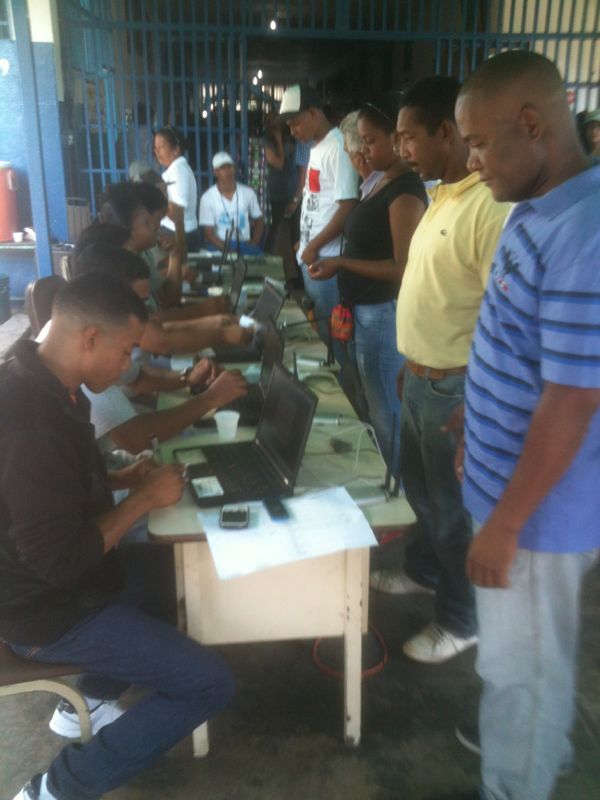
There is a nice atmosphere here with vendors outside selling refreshments. Both party representatives confirm that voting has been going well so far.
9:17 AM EDT: An election monitor reports that in Ciudad Tavacare, “lines started at 3:30 am, with polls opening at 6:15 am. Quick and calm procession of voters, approximately 60 seconds per person from start of registration to pinky inking.”
9:06 AM EDT: An election monitor describes the opening of a voting center at 6 a.m. in Maracaibo, Zulia at the Centro Educativo Presbítero Lisandro Puche grammar school, and how the voting process works:
The school had seven polling booths for 3,580 registered voters. The CNE selects the polling stations we will be visited based on stations that “emblematic” of other stations, mainly those they have more that are in popular neighborhoods and have a lot of polling stations. We will try to visit about 10 polling centers today.
There were two lines of about 200 people waiting when we arrived at 6 a.m. Many had been in line since 4 a.m. There was one line for the elderly and disabled who need assistance in voting, and another line for everyone else. Those who need assistance can have a representative with them to accompany them. If they do not have someone, they are assigned someone to assist. Any one person can only assist one voter that day to make sure there is no undue influence.
Per the Venezuelan Constitution, the polling centers must open at 6 a.m. The staff at each polling station signs a “Constitutional Act” certifying that the station is opening. The technical staff turned on the voter machines and ran a few tests to make sure they are operational. The staff cheered when the machines were turned on. Members of the staff voted to test the system.
By 6:40 when we left the polling center, two of the voter machines still were not working. One machine had a cable issue that they thought could be resolved. The other machine needed to be replaced. The polling center coordinator was in touch with the CNE’s technical center to request a new voting machine. [Note: this election monitor later reported to us that the broken voting machine was replaced by 7:11 am.]
The voting process is as follows:
- The voter is allowed to enter the school gates and sits in a line of about five people. When it’s their turn, they are called inside.
- If the voter needs assistance voting, they are assigned someone.
- The voter presents her/his government identification card (current or expired). Three laptops were set up to verify that the voter was registered. A square ticket is printed out that says which of the polling stations they are assigned.
- Once in the voting station (classroom), the voter gives her/his ID to someone and verifies their fingerprint on a machine. Finger prints are required for registering to vote.
- The voter goes to the voting machine and presses their choice of candidate. A paper receipt is printed. The voter puts the ticket in a sealed box. (This process takes less than two minutes.)
- The voter’s ID card is verified again. S/he signs next to the voter registration list and inks her/his finger print.
- The voter’s ink is washed off and s/he is free to go.
The ID verification/finger print machine and the voting machine is backed up with a battery in case of electricity problems.
In one polling station, the first voter of the day waited about 30 minutes before the machine had been tested. He was patient and didn’t seem to mind.
8:27 AM EDT: Some U.S. and U.K. media coverage presenting context for today’s elections paints an overly negative image of Venezuela’s economy, despite that Venezuela had 5.6 percent economic growth in 2012, has a low foreign debt burden and real, inflation-adjusted per person income that has grown by 2.5 percent annually since 2004, among other indicators.
Bloomberg’s article “Chavez Heir Maduro Would Inherit Venezuela Economic Woes” begins: “Nicolas Maduro is counting on a wave of sympathy for late Venezuelan President Hugo Chavez to win election on April 14. Should he succeed, he’ll be on his own as he confronts accelerating inflation, shortages of consumer goods and weakening growth.”
USA Today: “Chávez was a dazzling figure to his supporters — often seen as the man who seized wealth and claimed it was for the poor. Because of his popularity, he’s not often blamed for the country’s slide into economic chaos.”
Los Angeles Times: “His behavior has eroded some of that goodwill he inherited from Chavez, but so has the deterioration of the economy, the widespread discontent with increasing shortages of foodstuffs, and rising insecurity. It’s all playing into the hands of Capriles,” Bagley said.
Inter Press Service: “Venezuela’s economic challenges, more than the uncertainty over who will succeed late president Hugo Chávez, could threaten the oil diplomacy he practiced in the region.”
Reuters: “Anticipating a probable loss, some in the opposition are consoling themselves that Capriles would not inherit what they see as the complicated mess that Venezuela’s economy and society present to the winner of Sunday’s election.”
Also from Reuters: “For his part, Capriles has described Maduro, a 50-year-old former bus driver, as a faint echo of Chavez and a political novice without a coherent plan to address problems such as rampant violent crime, high inflation and a slowing economy.”
Again, Venezuela’s economy grew 5.6 percent last year, and 4.2 percent in 2011. But as we have pointed out in response to recent NPR coverage, inflation does not measure living standards – it is real income, adjusted for inflation, that measures living standards. The income of Venezuela’s poor has grown faster than inflation, while unemployment was reduced from 14.5 percent when Chávez took office to 8 percent in 2012.
7:58 AM EDT: An election monitor from the National Lawyers Guild witnessed the installation of a new voting center in Caracas on Friday:
The people who are selected by a random system [for the positions of] president, secretary, members and asst for polling stations gathered today to review the machines and materials to make sure that everything is in order for the election on Sunday. At the polling station we visited everything checked out fine. I was also really pleased to see that one of our recommendations following the October election has been implemented. We had recommended increasing the height of the screen to provide more privacy. Although it was not possible to see the choice it had been possible to see whether a person voted for a candidate at the top or bottom portion of the screen. The higher screen means that this is no longer possible.
7:26 AM EDT: The Americas Blog is live-blogging Venezuela’s presidential elections today, in which millions of voters will choose between Nicolás Maduro – the current interim president of Venezuela and Chávez’s former Vice President – and opposition challenger Henrique Capriles Radonski, who is governor of the state of Miranda. We’ll be providing updates here throughout the day.
We’re in touch with various people monitoring the electoral process in different parts of the country, as well as journalists. And we’ll be tracking media coverage throughout the day, and also statements from the political campaigns, UNASUR monitors, and other sources.
Today’s presidential elections will be the first not to include Chávez on the ballot since 1998. Recent polls by pollster Datanalisis have shown Maduro with a 10 – 14 point lead over Capriles. This is a similar margin to the advance polling – and later the actual 11 point electoral victory – that Chávez had over Capriles in the October 2012 elections (which we also live blogged).
The Consejo Nacional Electoral (CNE – Venezuela’s electoral authority) has invited some 150 international electoral monitors to observe the electoral systems and Sunday’s voting and electoral procedures. These include “electoral experts, parliamentarians, representatives of political organizations, trade unions, journalists and academics,” including former president Álvaro Colom of Guatemala, and delegates from UNASUR, MERCOSUR, the Carter Center, the Unión Interamericana de Organismos Electorales (UNIORE) and others. As in October, we will receive real time updates from several such election “acompañantes” – as well as from other contacts who will be unofficially monitoring the electoral process – through the end of Sunday, which we will post here.
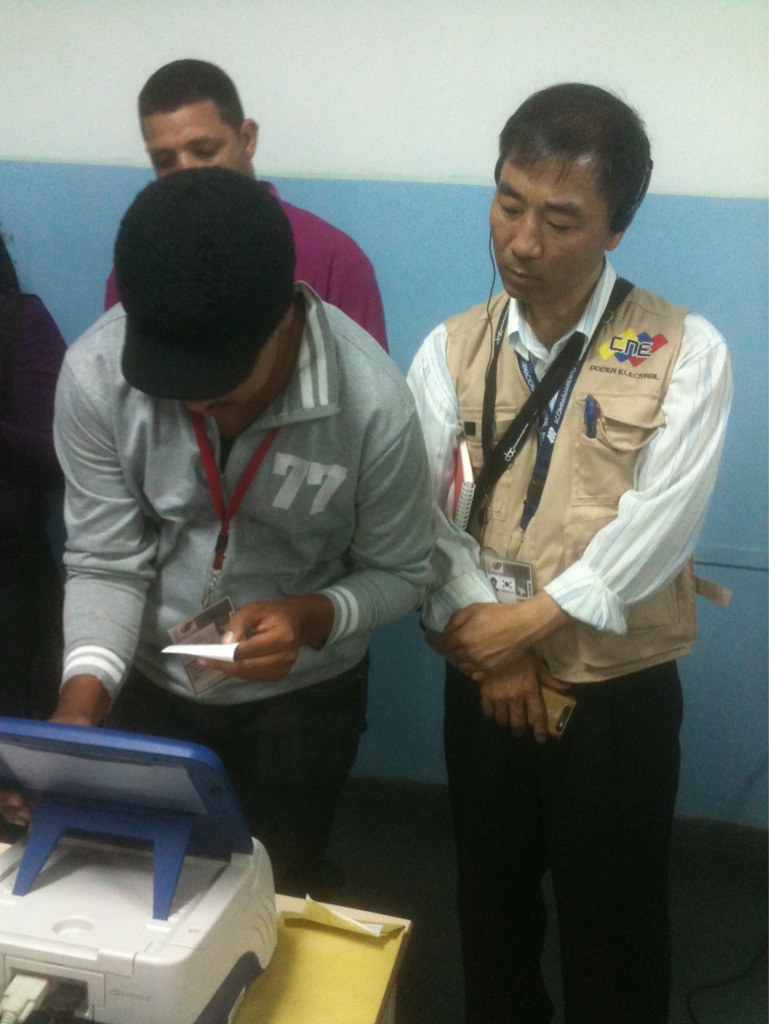
Former president and Carter Center founder Jimmy Carter has called Venezuela’s electoral system “the best in the world” among “the 92 elections that we’ve monitored,” and observers from the E.U. and the OAS have praised other recent Venezuelan elections as free and fair. But despite such repeated international affirmation of the integrity of Venezuela’s electoral system, and the presence of 150 informal observers, there are worrying signs that the opposition may not recognize the results if Capriles is not declared the winner. Capriles’ campaign issued a statement earlier this week explaining that Capriles would not sign a declaration that he would recognize the electoral results, but rather issued his own statement vowing to respect “the Constitution and the laws…for my law is the expression of the people.”
In the statement, Capriles also explained,”This little group of enchufados [connected, or plugged-in ones] intend for us to stay idle. I’m not the same as on October 7; I tolerated a lot of abuse; I am going to defend the vote of the people; if they think we’re idiots they will be disappointed.”
In remarks to election acompañantes on Friday, campaign spokespersons said that the acompañantes’ “presence amongst us is very important to ensure free, fair and transparent elections,” and that they also will honor the “will of the people” on Sunday.
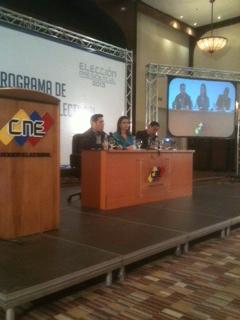
The Capriles campaign has also claimed that some polls show a rapidly shrinking poll gap between the two candidates, but such claims do not appear to have been taken too seriously by international media.
For his part, Maduro has declared that he will recognize the results.
On the issues, in a sign of how deeply Chávez and the political and social movements that backed him have transformed the political landscape, Capriles has been campaigning with promises to “improve, expand and de-politicize” (as Reuters put it) government programs that provide free services to the poor. In response to a recent Maduro campaign pledge to greatly increase the minimum wage this year in three increments, Capriles has said he would implement an immediate 40 percent increase if elected.
This fits into what seems to be a central Capriles campaign strategy: to divide the chavista vote by depicting Maduro as a pale imitation of Chávez while making Capriles appear a more practical option for maintaining Chávez’s achievements. These themes have also been echoed in much U.S. media coverage of the campaign.
While Capriles has said he wants to adopt an approach similar to former president of Brazil Lula da Silva’s, Lula himself stated in a recent video that “Chávez and Maduro thought the same way about the challenge facing Venezuela, in defense of the poorest,” and that Maduro would continue Chávez’s goal of ending Venezuela’s “resource course” by expanding agriculture and industrialization.
One notable campaign difference is that Capriles has said he would discontinue subsidized oil shipments to Cuba. It is unclear how such a policy shift would affect medical services in Venezuela, however, since Cuba provides doctors to Venezuela in exchange.





